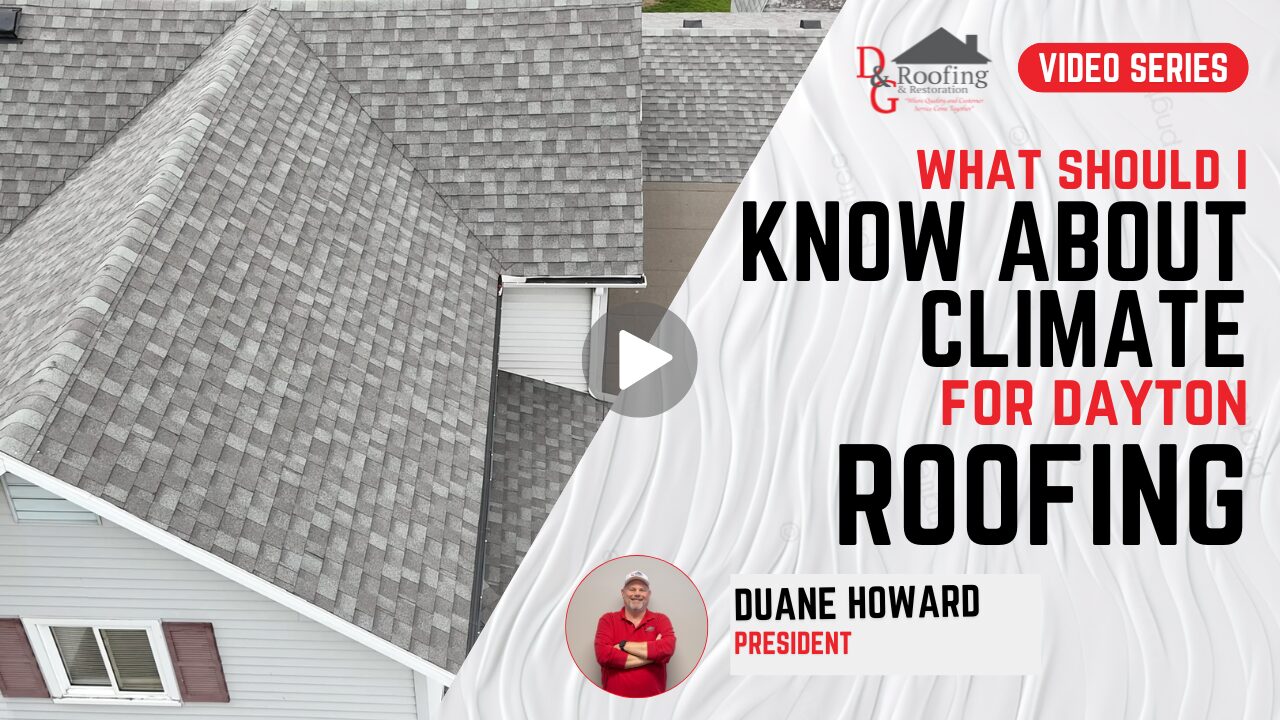When planning a roofing project in Dayton, it’s important to consider the local climate. Climate considerations for roofing play a significant role in choosing the right materials and installation methods. Dayton’s 50-50 weather pattern, with fluctuating temperatures between warmer and freezing conditions, means homeowners need to be aware of how these climate factors can affect the longevity and performance of their roof. In this post, we’ll break down what you need to know about climate considerations for roofing in Dayton.
The Climate in Dayton – Understanding the Extremes
Dayton’s climate is unique because it’s right on the border between northern climate zones and the more temperate southern zones. As a result, we experience a blend of both hot, humid summers and cold, snowy winters. This has an impact on the roofing materials you choose, as well as the methods used during installation. Since Dayton falls in a region with such fluctuating temperatures, it’s essential to understand how the climate affects roofing systems.
What This Means for Your Roof
The back-and-forth between freezing and warm temperatures can stress roofing materials, causing them to expand and contract. Over time, this constant movement can lead to damage. Roofs in Dayton need to be strong, durable, and properly installed to withstand these dramatic shifts. This is why local contractors often recommend certain roofing materials and installation methods that are designed to handle these conditions.
How Dayton’s Climate Affects Roofing Materials
Manufacturers understand the unique weather conditions in Dayton and other similar regions. As a result, they design roofing products specifically for each climate zone. In Dayton, certain colors, underlayments, and shingles are recommended to handle both high heat and freezing temperatures.
Roofing Materials You Should Consider
- Underlayments: Municipalities in Dayton require specific underlayments for roofing installations. These materials help provide additional protection to your roof by acting as a barrier against water, ice, and snow. These products are designed to prevent moisture infiltration, especially during the colder months when ice dams can form.
- Shingles: The types of shingles you choose will also depend on the local climate. Asphalt shingles, for example, are popular in Dayton because they perform well in both hot and cold temperatures, providing long-lasting protection.
- Ventilation Systems: Proper roof ventilation is critical in Dayton’s climate. Without proper airflow, heat can become trapped in the attic, leading to premature roof wear and other moisture-related issues. Ensure your contractor assesses the ventilation needs of your roof.
The Importance of Working with a Local Roofing Contractor
Because Dayton has its own set of climate-specific requirements, it’s important to work with a roofing contractor who is familiar with these local factors. A contractor familiar with Dayton’s climate will ensure that your roof meets all the necessary code requirements and that the materials chosen are suitable for the local weather patterns. They will also know the best installation techniques to ensure the longevity of your new roof.
Code Compliance and Regulations
In Dayton, the state of Ohio, along with local municipalities, enforces specific codes regarding roofing materials and installation techniques. These codes are based on the local climate and are designed to make sure your roof will last. A roofing contractor who is up-to-date on these codes will be able to guide you through the process and ensure your roof meets all the required standards.
Key Takeaways
- Dayton’s weather fluctuates between hot summers and freezing winters, which impacts roofing materials.
- Local contractors understand the climate-specific needs for roofing systems in Dayton.
- Specific underlayments and materials are required for roofing in Dayton, according to local codes.
- Ventilation and proper installation techniques are critical to ensuring a long-lasting roof.
Conclusion
Choosing the right roofing materials and contractor for your Dayton home is essential to ensuring the longevity and effectiveness of your roof. With Dayton’s unique weather patterns, it’s important to be aware of the requirements and recommendations for roofing installations. If you need more information, be sure to read through our site or contact us today!

